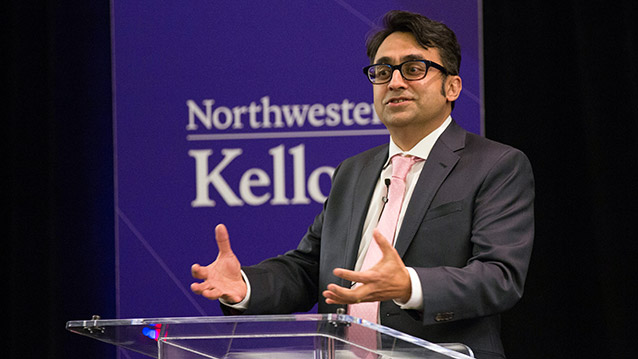In his corner office in the Jacobs Center, Professor Sandeep Baliga is surrounded by economists and political scientists. His department at the Kellogg School of Management — Managerial Economics and Decision Sciences — blends the more verbal and historical traditions of political science with the more mathematical world of economics. Baliga believes this sort of interdisciplinary work could help to make fundamental contributions to research and perhaps even have policy implications.
How does game theory apply to international relations?
Game theory is used a lot in economics to study companies, to see how businesses compete, collude and cooperate. To determine how companies try to keep competitors out of their business. These sort of strategic issues are handled using game theory. And exactly the same tools are useful to study international relations — just replace “companies” with “countries.” Game theory allows us to examine how countries cooperate, or when they might go to war or compete. We can look at what moves a country might make to stop another country from becoming more powerful.
How has your research in international relations incorporated game theory?
I’ve used game theory to investigate the strategy of terrorism, and when and how communication between countries may prevent or instigate terrorism. I’ve also used game theory in studying events leading up to the Iraq war. Specifically, would conflict have been avoided if we hadn’t sought to determine whether Saddam Hussein had weapons of mass destruction? Would it have been better — for the U.S. and for Iraq — to live with the uncertainty?
A third project of mine looked at whether democracies go to war more or less than other sorts of regimes. This was motivated by the Bush administration, because part of the rationale for invading Iraq was the idea that we would replace a dictatorship with a democracy, and democracies were touted as less warlike by both President Bush and President Clinton. What we found is that democracies are pretty peaceful with each other, but they can become warlike more quickly than other regimes. Surprisingly, we found that the most violent regime is this sort of “middle regime” — not a democracy, not a dictatorship. For example: Germany before World War I, France at various points in the 19th century, instances where there is a king and also a parliament, an Ayatollah and also an elected president.
Based on these findings, if a country like the U.S. invades another and tries to install a democracy, but doesn’t fully manage the transition and creates one of these middle regimes — that could be qualitatively worse than leaving an autocrat in power.
How could game theory inform international relations today?
Game theory could be used in foreign policy really to provide a framework to think through policy options. For example, if we arm the Syrian rebels, some players would benefit, others would lose. What would the effects have to be to imply the intervention is worthwhile? At least we would get qualitative insights into this sort of question. True quantitative work is difficult because of lack of good data. Despite that, we can at least get a handle on the internal logic of a policy by studying its strategic effects, perhaps uncovering things we had not thought of before we did the analysis and reaching a more reasoned conclusion. To some extent, this is part of what is done with economic policy with merger decisions. It would be great to have a similar voice in the room when there are foreign policy decisions being made.


